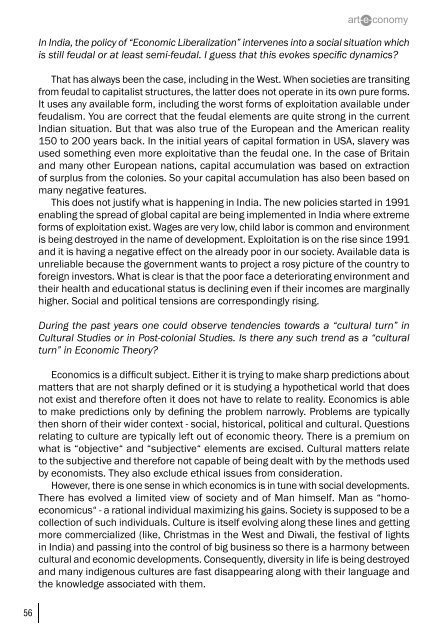art-e-conomy _ reader - marko stamenkovic
art-e-conomy _ reader - marko stamenkovic
art-e-conomy _ reader - marko stamenkovic
Create successful ePaper yourself
Turn your PDF publications into a flip-book with our unique Google optimized e-Paper software.
56<br />
In India, the policy of “Economic Liberalization” intervenes into a social situation which<br />
is still feudal or at least semi-feudal. I guess that this evokes specific dynamics?<br />
That has always been the case, including in the West. When societies are transiting<br />
from feudal to capitalist structures, the latter does not operate in its own pure forms.<br />
It uses any available form, including the worst forms of exploitation available under<br />
feudalism. You are correct that the feudal elements are quite strong in the current<br />
Indian situation. But that was also true of the European and the American reality<br />
150 to 200 years back. In the initial years of capital formation in USA, slavery was<br />
used something even more exploitative than the feudal one. In the case of Britain<br />
and many other European nations, capital accumulation was based on extraction<br />
of surplus from the colonies. So your capital accumulation has also been based on<br />
many negative features.<br />
This does not justify what is happening in India. The new policies st<strong>art</strong>ed in 1991<br />
enabling the spread of global capital are being implemented in India where extreme<br />
forms of exploitation exist. Wages are very low, child labor is common and environment<br />
is being destroyed in the name of development. Exploitation is on the rise since 1991<br />
and it is having a negative effect on the already poor in our society. Available data is<br />
unreliable because the government wants to project a rosy picture of the country to<br />
foreign investors. What is clear is that the poor face a deteriorating environment and<br />
their health and educational status is declining even if their incomes are marginally<br />
higher. Social and political tensions are correspondingly rising.<br />
During the past years one could observe tendencies towards a “cultural turn” in<br />
Cultural Studies or in Post-colonial Studies. Is there any such trend as a “cultural<br />
turn” in Economic Theory?<br />
Economics is a difficult subject. Either it is trying to make sharp predictions about<br />
matters that are not sharply defined or it is studying a hypothetical world that does<br />
not exist and therefore often it does not have to relate to reality. Economics is able<br />
to make predictions only by defining the problem narrowly. Problems are typically<br />
then shorn of their wider context - social, historical, political and cultural. Questions<br />
relating to culture are typically left out of economic theory. There is a premium on<br />
what is “objective“ and “subjective“ elements are excised. Cultural matters relate<br />
to the subjective and therefore not capable of being dealt with by the methods used<br />
by economists. They also exclude ethical issues from consideration.<br />
However, there is one sense in which economics is in tune with social developments.<br />
There has evolved a limited view of society and of Man himself. Man as “homoeconomicus“<br />
- a rational individual maximizing his gains. Society is supposed to be a<br />
collection of such individuals. Culture is itself evolving along these lines and getting<br />
more commercialized (like, Christmas in the West and Diwali, the festival of lights<br />
in India) and passing into the control of big business so there is a harmony between<br />
cultural and economic developments. Consequently, diversity in life is being destroyed<br />
and many indigenous cultures are fast disappearing along with their language and<br />
the knowledge associated with them.


